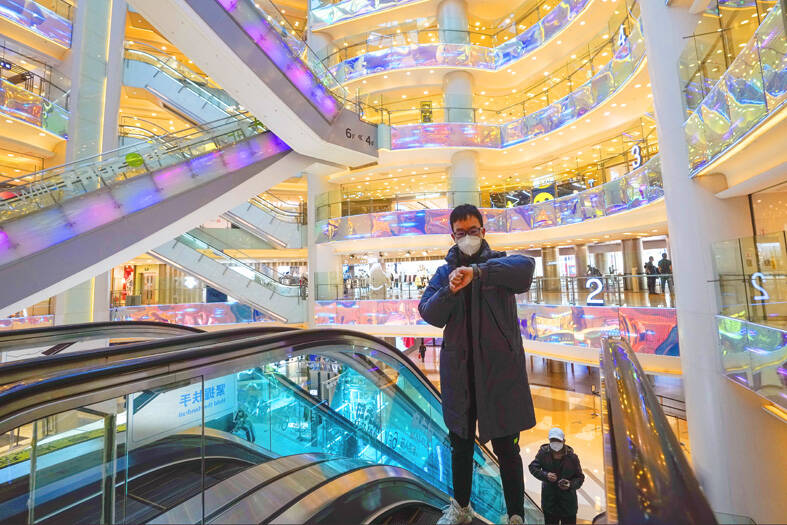The world’s top fund managers are mostly bullish on Chinese stocks next year, predicting that equities will continue to rally as strict COVID-19 measures are relaxed.
About 60 percent of respondents in a Bloomberg News survey recommended buying the country’s stocks, while 31 percent said they are a sell.
On top of optimism about China’s reopening, easing geopolitical tensions and cheap valuations are reasons to buy, according to the informal survey of 134 fund managers.

Photo: AP
“It does seem like there is an evolution from China in terms of their COVID approach,” said Ben Powell, APAC chief investment strategist, BlackRock Investment Institute.
He sees upside potential for earnings in China, and downside potential in the US and Europe.
After a rough year, Chinese stocks are ending this year with a big rebound. The Hang Seng China Enterprises Index stormed into a bull market last month, and is up 38 percent since its October low.
However, the gauge is still down 44 percent from its peak in February last year.
Investors in the survey also see China’s stocks as attractively valued. The MSCI China Index is trading at 11 times forward earnings, below the average level for the past five years.
While the 12-month earnings forecast for the MSCI China Index has risen in the past month, it is still well below pre-pandemic levels, Bloomberg data show.
The bullishness on China was echoed this week by JPMorgan Chase & Co strategist Marko Kolanovic, who said in his outlook for next year that he is still positive on the country amid favorable monetary conditions and an eventual full reopening.
Still, not all survey participants were so positive.
Fund managers said the biggest risks for Chinese equities are uncertainty about government policy and regulations.
“Headwinds remain, on the geopolitical front, on the reopening from ‘zero COVID’ policies and on the regulatory environment,” said Fabiana Fedeli, CIO for equities, multiasset and sustainabilty at M&G Investments.
While there are opportunities in China, investors need to be selective, she said.

Greek tourism student Katerina quit within a month of starting work at a five-star hotel in Halkidiki, one of the country’s top destinations, because she said conditions were so dire. Beyond the bad pay, the 22-year-old said that her working and living conditions were “miserable and unacceptable.” Millions holiday in Greece every year, but its vital tourism industry is finding it harder and harder to recruit Greeks to look after them. “I was asked to work in any department of the hotel where there was a need, from service to cleaning,” said Katerina, a tourism and marketing student, who would

i Gasoline and diesel prices at fuel stations are this week to rise NT$0.1 per liter, as tensions in the Middle East pushed crude oil prices higher last week, CPC Corp, Taiwan (台灣中油) and Formosa Petrochemical Corp (台塑石化) said yesterday. International crude oil prices last week rose for the third consecutive week due to an escalating conflict between Israel and Iran, as the market is concerned that the situation in the Middle East might affect crude oil supply, CPC and Formosa said in separate statements. Front-month Brent crude oil futures — the international oil benchmark — rose 3.75 percent to settle at US$77.01

Merida Industry Co (美利達) has seen signs of recovery in the US and European markets this year, as customers are gradually depleting their inventories, the bicycle maker told shareholders yesterday. Given robust growth in new orders at its Taiwanese factory, coupled with its subsidiaries’ improving performance, Merida said it remains confident about the bicycle market’s prospects and expects steady growth in its core business this year. CAUTION ON CHINA However, the company must handle the Chinese market with great caution, as sales of road bikes there have declined significantly, affecting its revenue and profitability, Merida said in a statement, adding that it would

UNCERTAINTIES: The world’s biggest chip packager and tester is closely monitoring the US’ tariff policy before making any capacity adjustments, a company official said ASE Technology Holding Inc (日月光投控), the world’s biggest chip packager and tester, yesterday said it is cautiously evaluating new advanced packaging capacity expansion in the US in response to customers’ requests amid uncertainties about the US’ tariff policy. Compared with its semiconductor peers, ASE has been relatively prudent about building new capacity in the US. However, the company is adjusting its global manufacturing footprint expansion after US President Donald Trump announced “reciprocal” tariffs in April, and new import duties targeting semiconductors and other items that are vital to national security. ASE subsidiary Siliconware Precision Industries Co (SPIL, 矽品精密) is participating in Nvidia